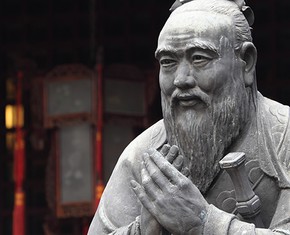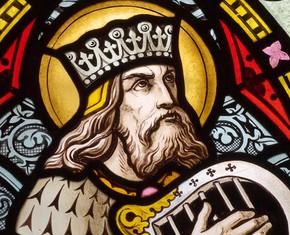The views expressed in our content reflect individual perspectives and do not represent the authoritative views of the Baha'i Faith.
Who is “the spirit of truth?” The phrase is probably familiar to you if you’re a Christian, and even if you’re not:
And I will pray the Father, and he shall give you another Comforter, that he may abide with you for ever; Even the Spirit of truth; whom the world cannot receive, because it seeth him not, neither knoweth him: but ye know him; for he dwelleth with you, and shall be in you. – John 14:16–17.
I have yet many things to say unto you, but ye cannot bear them now. Howbeit when he, the Spirit of truth, is come, he will guide you into all truth: for he shall not speak of himself; but whatsoever he shall hear, that shall he speak: and he will shew you things to come. – John 16:12–13.
The answer to the question may inspire a moment of truth—a flash of insight and an awakening of faith. Baha’u’llah declared himself as the “Spirit of Truth” (or “Comforter”) predicted by Jesus in his “Farewell Discourse” (John 13:31–16:33):
Announce thou unto the priests: Lo! He Who is the Ruler is come. Step out from behind the veil in the name of thy Lord, He Who layeth low the necks of all men. Proclaim then unto all mankind the glad-tidings of this mighty, this glorious Revelation. Verily, He Who is the Spirit of Truth is come to guide you unto all truth. He speaketh not as prompted by His own self, but as bidden by Him Who is the All-Knowing, the All-Wise. Say, this is the One Who hath glorified the Son and hath exalted His Cause. – Baha’u’llah, “The Most Holy Tablet” (also known as the “Tablet to the Christians”), Tablets of Baha’u’llah, p. 12.
In the Gospel of John, the Spirit of Truth is the “paráklētos,” or “Paraclete.” In Jesus’s Farewell Discourse, the Paraclete is mentioned four times. Grammatically, the Paraclete’s gender is masculine, as opposed to that of the “Spirit,” which is neuter. This may be a distinction with a notable difference.
Biblical scholar Marie E. Isaacs, in her peer-reviewed journal article, “The Prophetic Spirit in the Fourth Gospel,” stated: “Nowhere in John is the spirit-paraclete called prophētēs. The functions assigned to the paraclete however, strikingly parallel those of the prophet of the Old Testament.” – p. 393.
In the section, “Prophetic Functions ascribed to the Spirit-Paraclete” (393–399), Isaacs points out that the Spirit of Truth serves as: (1) Divine Messenger; (2) One who glorifies Jesus; (3) Teacher; (4) Witness; (5) Predictor; (6) One who is rejected; and (7) The Abiding Spirit.
Let’s look at those roles, and demonstrate how Baha’u’llah satisfies each of these prophetic functions of the Spirit of Truth, in accordance with the prophecies of Jesus:
1. Divine Messenger: The Bible says:
But the Comforter, which is the Holy Ghost, whom the Father will send in my name, he shall teach you all things, and bring all things to your remembrance, whatsoever I have said unto you. – John 14:26.
The Comforter, according to this passage, is the Holy Spirit. There’s no reason to dispute this. The descent of the Holy Spirit upon the disciples gathered in the Upper Room, as vividly described in Acts 2:1–13, represents the birth of the Christian church, as Abdu’l-Baha explained:
The descent of the Holy Spirit upon the Apostles means that that glorious and divine grace cast its light and splendour upon their realities. – Abdu’l-Baha, Some Answered Questions, newly revised edition, p. 122.
Then, after quoting John 16:12, Abdu’l-Baha further explained:
Now consider carefully that the words ‘for he shall not speak of himself; but whatsoever he shall hear, that shall he speak’ clearly imply that the Spirit of truth is embodied in a Man Who has a soul, Who has ears to hear and a tongue to speak. – Ibid., p. 123.
Here, we see that Abdu’l-Baha does the following: (1) allows for the Christian understanding of the Paraclete as the Holy Spirit; (2) and, at the same time, affirms the Baha’i understanding of the “Spirit of Truth” as the prophet and messenger of God Baha’u’llah.
Understanding the “Comforter” as the living presence of “the Holy Spirit” does not exclude the idea that the Comforter could also be a living Prophet as well. Early Muslims, for instance, claimed that Jesus foretold Muhammad, as the Paraclete, on the basis of Quran 61:6. So the understanding that the Comforter could be a God-sent messenger is not without precedent. Baha’is believe that Baha’u’llah was that divine messenger. Therefore, Baha’u’llah arguably meets this criterion.
2. Glorifier: The Bible says: “He shall glorify me.” – John 16:14a.
Baha’u’llah glorified Christ. Here is one well-known passage:
Know thou that when the Son of Man yielded up His breath to God, the whole creation wept with a great weeping. By sacrificing Himself, however, a fresh capacity was infused into all created things. Its evidences, as witnessed in all the peoples of the earth, are now manifest before thee. The deepest wisdom which the sages have uttered, the profoundest learning which any mind hath unfolded, the arts which the ablest hands have produced, the influence exerted by the most potent of rulers, are but manifestations of the quickening power released by His transcendent, His all-pervasive, and resplendent Spirit. – Baha’u’llah, Gleanings from the Writings of Baha’u’llah, pp. 85–86.
3. Teacher: The Bible says:
But the Comforter, which is the Holy Ghost, whom the Father will send in my name, he shall teach you all things, and bring all things to your remembrance, whatsoever I have said unto you. – John 14:26.
The Writings of Baha’u’llah comprise around 100 volumes. It would appear that Jesus’s promise that “he shall teach you all things” indicates, at the very least, a fuller disclosure of spiritual teachings than ever before. Baha’u’llah certainly matches this qualification as well.
4. Witness: The Bible says:
But when the Comforter is come, whom I will send unto you from the Father, even the Spirit of truth, which proceedeth from the Father, he shall testify of me. – John 15:26.
Baha’u’llah’s glorification of Christ comes from the same tablet as the passage quoted above, and ends on this high note:
We testify that when He came into the world, He shed the splendor of His glory upon all created things. Through Him the leper recovered from the leprosy of perversity and ignorance. Through Him, the unchaste and wayward were healed. Through His power, born of Almighty God, the eyes of the blind were opened, and the soul of the sinner sanctified. … He it is Who purified the world. Blessed is the man who, with a face beaming with light, hath turned towards Him. – Baha’u’llah, Gleanings from the Writings of Baha’u’llah, p. 86.
5. Predictor: The Bible says:
Howbeit when he, the Spirit of truth, is come, he will guide you into all truth: for he shall not speak of himself; but whatsoever he shall hear, that shall he speak: and he will shew you things to come. – John 16:12-13.
Baha’u’llah’s prophecies feature short-term predictions that historically came true, and long-term prognostications that serve as grand and inspiring visions of the future.
6. One who is rejected: The Bible says:
Even the Spirit of truth; whom the world cannot receive, because it seeth him not, neither knoweth him: but ye know him; for he dwelleth with you, and shall be in you. – John 14:17.
Here, the Spirit of Truth is one “whom the world cannot receive, because it seeth him not, neither knoweth him.” This refers to one who is rejected, even persecuted. Throughout his writings, Baha’u’llah speaks of his rejection and persecution, especially by the Muslim clergy of his day. This is a recurring leitmotif found throughout Baha’u’llah’s writings. Thus this prophetic credential is also met.
7. The Abiding Spirit: The Bible says:
Abide in me, and I in you. – John 14:4.
Even the Spirit of truth; whom the world cannot receive, because it seeth him not, neither knoweth him: but ye know him; for he dwelleth with you, and shall be in you. – John 14:17.
Baha’u’llah wrote:
O Son of Man! The temple of being is My throne; cleanse it of all things, that there I may be established and there I may abide. – Baha’u’llah, The Hidden Words, p. 17.
To “abide” means to dwell within, i.e. to experience a vibrant spiritual presence, influence, source of inspiration and moral guidance. After Jesus ascended to heaven, his living spirit dwelled within the hearts of his followers. Here, Baha’u’llah is also talking about the Holy Spirit in the same living, abiding, and guiding sense that Jesus did.
All this does not prove conclusively that Baha’u’llah is the Spirit of Truth, of course. Nevertheless, the comments above provide strong, compelling evidence that Baha’u’llah’s truth-claims find credible support in Biblical prophecy. The rest is a matter of faith.
















Comments
Sign in or create an account
Continue with Googleor